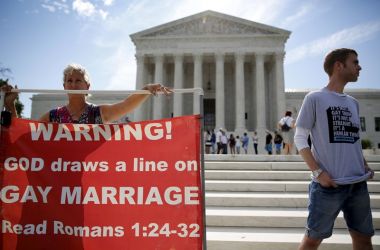Gay marriage is legal in the US. Try not to worry.

So, now we know. In what is bound to be seen as a cataclysmic defeat by conservative evangelicals, who have thrown everything they have into the fight, the US Supreme Court has ruled that the Constitution provides same-sex couples the right to marry and that individual states can't ban it.
President Obama, in a Rob Bell reference that may not have been entirely coincidental, hailed the news in a tweet with the LoveWins hashtag.
In truth, whatever the result of the court's decision, the evangelical battle for public opinion was lost years ago. Opinion poll after opinion poll has shown Americans becoming more and more tolerant of homosexuality and more inclined to favour same-sex marriage if that was what would make people happy.
There have been all sorts of unwisely apocalyptic statements from prominent evangelical leaders about the consequences of a vote for gay marriage. For whatever reason, homosexuality is seen in the evangelical community as the defining issue of the times. But the genie is out, and that's that.
There are undeniably serious issues at stake regarding religious liberty and homosexuality, though it is hard to see how the Supreme Court's ruling makes these any more serious. Many of them revolve around anti-discrimination laws, which conservatives who want to refuse to cater for gay weddings, for example, are falling foul of anyway. But evangelicals are going to have to get used to living in a society which is no longer as congenial to them as once it was.
The immediate consequence of this ruling, then, is an invitation to do some theology. One of the painful things for observers of the evangelical scene on both sides of the Atlantic has been the reluctance of 'pro-marriage' (= anti-gay marriage) campaigners to distinguish their idea of the Church from their idea of the state, as though the two were coterminous.
So here's a discussion starter.
It is entirely up to the state to declare what relationships it will recognise as marriage, and the Church should not have a problem with that.
It is entirely up to the Church to declare what relationships it will recognise as Christian marriage, and the State should not have a problem with that.
The state should jealously guard its prerogative from the Church, and ensure that it provides equality under the law for all its citizens.
The Church should jealously guard its prerogative from the state, and ensure that it is never coerced into bringing its beliefs and practices into line with those of the majority if it doesn't want to.
Evangelicals (and others) have got themselves into a knot because they think the state is trying to define Christian marriage. It isn't; it can't, and it never could. But the long history of Christendom has allowed Christians to think that the two are the same. Most Americans have always been keen on the separation of Church and state; well, now's the chance to find out whether you mean it.
The real crisis facing family life, in America and in the UK, is not gay marriage, but divorce and family breakdown. Now that the legal argument is over, perhaps the energies which have been poured into a needless and counter-productive battle can be more usefully directed.











